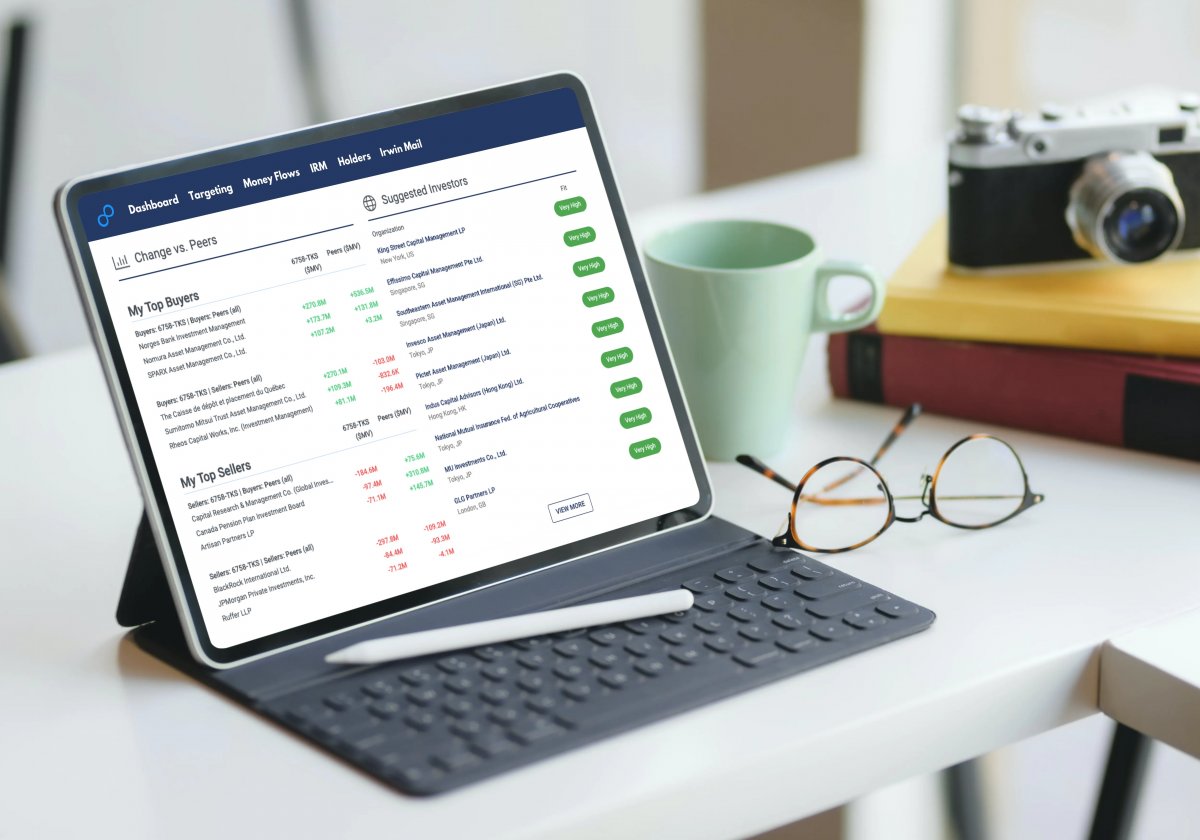[vc_row][vc_column][vc_column_text]Investor relations plays a key role in maintaining the symbiotic relationship between publicly traded companies and investors. The role, which combines the best of communication, finance, marketing, and strategy, has been long overdue for technology that makes the constantly evolving process easier.
Enter Irwin.
Co-Founders David Whyte and Mark Fasken spent years in capital markets and sales and marketing at high-growth software companies respectively. In that time, they realized the need—and the opportunity—for innovative technology for modern investor relations teams.
“The traditional investor relations officer (IRO) role has evolved,” said Whyte. “We like to explain it as a mix of marketing, sales, strategy, and customer success. They’re responsible for controlling the flow of information between a public company, its investors, and its stakeholders, and keeping everyone informed and happy. That’s a lot of hats to wear, but Irwin’s software simplifies their daily workflow through three key functions.”
Through providing investor intelligence and monitoring, investor targeting, and a CRM and email management system, Irwin streamlines the process of maintaining control of all investor interactions. And helps companies find and build relationships with the right investors. [/vc_column_text][vc_row_inner][vc_column_inner width=”1/2″][vc_single_image image=”23361″ img_size=”500×500″ add_caption=”yes”][/vc_column_inner][vc_column_inner width=”1/2″][vc_single_image image=”23362″ img_size=”500×500″ add_caption=”yes”][/vc_column_inner][/vc_row_inner][vc_column_text]Since the pandemic accelerated the adoption of new technologies, Irwin has tripled in size with nearly 50 percent of the company’s new clients being C-suite executives. And Whyte and Fasken look forward to seeing the company continue to grow.
“The pandemic has forced significant changes in the way capital markets professionals operate, and we’ve been fortunate to be able to help our clients navigate this digital transformation,” said Fasken. “We’re building solutions that allow them to rethink traditional ways of doing things.”
For this week’s Startup Spotlight, Bay Street Bull spoke with David Whyte and Mark Fasken, Co-Founders of Irwin, about modernizing investor relations and Irwin’s role in ensuring client success.[/vc_column_text][vc_text_separator title=”Q&A” color=”custom” style=”double” border_width=”2″ accent_color=”#1990ff”][vc_column_text]What is Irwin?
David: Irwin is a financial technology company that creates simple software for modern investor relations and capital markets professionals. Our flagship platform is an all-in-one subscription software that is used by global public companies and their advisors to monitor their current investor base, identify new investors, and record all investor interactions and contacts. In turn, using Irwin’s solution should lead to better stakeholder awareness, higher trading volumes, and more stable share prices for our customers. Simply put, Irwin’s software helps capital markets professionals build stronger relationships with the investment community.
Why was Irwin created?
David: The capital markets are incredibly powerful and important machines that have been a pillar of global innovation for the better part of one hundred years. Many of the products and services that we enjoy today are a direct result of efficient capital markets, but there’s still a lot of friction in the system. I think we can do better to accelerate innovation and from the beginning we wanted Irwin to have a big impact on that.
Before founding Irwin, I spent ten years working in investment banking and sales and trading, connecting some of the world’s largest companies with institutional investors and advising on various capital-raising strategies. Capital markets is a highly regulated industry, and I got a first-hand view of the complex challenges public companies and their advisors faced. One in particular that frequently frustrated me and my clients was the fact that companies were not necessarily being ushered to the most appropriate investors for their unique business, and this is what sparked the idea for what Irwin would eventually become. The day I left my role at Credit Suisse was the same day I walked across the street to incorporate Irwin, with the mission to create a more transparent and equitable way to connect companies and investors.
Mark: At the beginning of 2018, a number of regulatory and industry changes took place that put pressure on investment banks. As a result, they focused their efforts on marketing large and mega-cap companies, and we saw small and mid-cap companies start to receive significantly less coverage. Before, issuers of any size were reliant on banks for access to investors, but now these smaller companies were forced to access, target, and manage investor outreach themselves. The companies we spoke to were not prepared and did not have the right market intelligence or organizational tools they needed to run successful investor relations programs. When the larger companies we were working with also started to experience this pain point, we knew there was a need for a big change.
We researched various investor relations software platforms that were currently on the market. We spoke with the capital markets professionals who were using these products, and we consistently heard that these existing solutions were too bulky, archaic, and expensive. We couldn’t find an affordable, modern, and easy-to-use solution, so we decided to build it ourselves. [/vc_column_text][vc_gallery interval=”3″ images=”23355,23356,23357″ img_size=”full” onclick=””][vc_column_text]Were there any challenges in bringing it to life? If so, how did you overcome them?
Mark: Simplicity is one of Irwin’s key values, but we operate in an industry that is highly competitive and regulated. We had to figure out how to build a product that was simple to use but robust in its capabilities.
The answer to overcoming this challenge was having a narrow focus. Rather than going after the entire banking ecosystem and serving large, diverse client bases, we spent countless hours speaking with customers specifically in the investor relations role. We really wanted to understand the problems they faced day-to-day in executing successful IR programs. From the very beginning, we created an active feedback loop to iterate and evolve Irwin’s software. This feedback is taken and directly integrated into both product and service level updates. We’ve made our customers the focal point of our business, and we take a hands-on approach to each client relationship to continue to serve them.
David: Capital markets is a challenging industry with a lot of moving parts and different constituents. We’re competing against well-established and multi-billion dollar companies. There’s always an ongoing conversation or an expectation, especially in fintech, that the natural course of the business is to raise more money from outside investors to be competitive. You could say we are taking a non-traditional route by not raising the most amount of capital that we can and instead, if necessary, slowing growth down to focus on the success of each and every one of our clients. We’re building a business for the long term and in order to do that we need each of our clients to be a strong advocate from day one.
RELATED: How Deel Makes Hiring Internationally Easier Than Ever
How does Irwin help simplify investor relations?
Mark: The traditional investor relations officer (IRO) role has evolved. We like to explain it as a mix of marketing, sales, strategy, and customer success. They’re responsible for controlling the flow of information between a public company, its investors, and its stakeholders, and keeping everyone informed and happy. That’s a lot of hats to wear, but Irwin’s software simplifies their daily workflow through three key functions.
The first is investor intelligence and monitoring. We provide global holdings data on organizations worldwide, and our database gives IROs all the financial information they could possibly need at their fingertips. They see a complete view of what their investors are doing, who’s buying and selling, and they can keep tabs on selected peers and sectors.
David: The second is investor targeting. We’re the only platform where users can search for both reporting and non-reporting investors such as family offices and retail investment advisors. We also developed a proprietary algorithm called the Fit Score that suggests whether an investor is a right fit based on select criteria such as market cap, sector, geography, and peers. It’s dynamic, so it’s constantly changing based on the investor’s holdings and activity.
One of the main metrics IROs are measured against is booking quality meetings with investors. They shouldn’t have to spend hours mining through data to find the right investors. Irwin identifies the right investors in less time and includes up-to-date contact information for outreach.
Lastly, we built a CRM and email management integration so IROs can report on the impact those meetings create and maintain all their IR-related activity in one place. This means they no longer need to track activity and log meetings manually in spreadsheets, which is something we still see quite often. They can export information necessary for earnings calls and annual general meetings directly from Irwin to present to management.
Mark: When you put it all together, we’ve created a way for our clients to execute an active investor relations outreach strategy in the most streamlined and scalable way.
Who should be using Irwin?
David: We have a number of different audiences, the largest being internal investor relations officers at public companies across any market cap and sector that are looking to grow and better understand their shareholder base. External consultants and investor relations advisors who are looking to better support their clients are another, and a growing number of investment banks are signing on as well.
Mark: Interestingly, to start the 2021 year, almost 50 percent of Irwin’s new users were C-suite executives. We tend to see the responsibilities of investor relations land on CEOs or CFOs at small-cap companies. The bigger the market cap, the more hands-off an executive typically is, but they’ll still use Irwin for transparency into how their IRO or consultant is handling shareholder outreach and communication. This stat speaks to the growing importance of the investor relations function overall within a public company.


What has the response been like from users?
Mark: The response we’ve received since launch four years ago has been extremely positive. As we mentioned earlier, we’ve invested heavily in customer support and going the extra mile to save our clients time. That’s paid off for us because our second-largest source of new business is referrals. At the end of the day, our client’s success is our success.
The uptake in digital technologies and channels has also accelerated our business over the past year, and we’ve more than tripled in size. The pandemic has forced significant changes in the way capital markets professionals operate, and we’ve been fortunate to be able to help our clients navigate this digital transformation. We’re building solutions that allow them to rethink traditional ways of doing things.
What is the overall mission of Irwin?
David: Irwin’s mission is to seamlessly connect the world’s capital seekers and allocators to make them more productive, innovative, and successful.
A better way to explain what we’re doing is through an analogy. Imagine if we had a time machine and transported a trader from the 1990s to now. They’d be very confused and wouldn’t know what to do with the advanced technologies that are now being used. But if you did the same for an IRO, CEO, investment banker, private equity investor, equity research analyst, or institutional salesperson, they’d still feel right at home. The innovation in capital markets has largely been directed to trading execution, while technologies that can help other roles in the ecosystem have yet to be widely adopted.
That’s why Irwin applies modern sales, data, and marketing technologies to the investor relations and investment banking roles, and the companies that adopt our software are going to be successful.
Where would you like to see the company in five, 10 years?
Mark: We hope to have a larger global presence, including offices, employees, and more customers all over the world. We also want to create a diverse set of products that serve different customer segments in the capital markets ecosystem, so that means expanding to include services and tools investment banks and investment managers would use to be more efficient. As long as we’re continuing to build innovative solutions that solve complex problems, we’ll be happy.
Is there anything else you would like to add?
David: We often run up against prospects that don’t want to try new technology or that are resistant to change. We want professionals to know that there are financial technology startups out there today that are building products that better suit their needs and working style. We know there are IROs out there looking for providers that prioritize customer support and offer a white-glove experience. That’s Irwin. We have an incredible team that gives our clients unparalleled support, and a product that delivers results. We’re worth looking into. [/vc_column_text][vc_separator color=”custom” accent_color=”#1990ff”][/vc_column][/vc_row]













